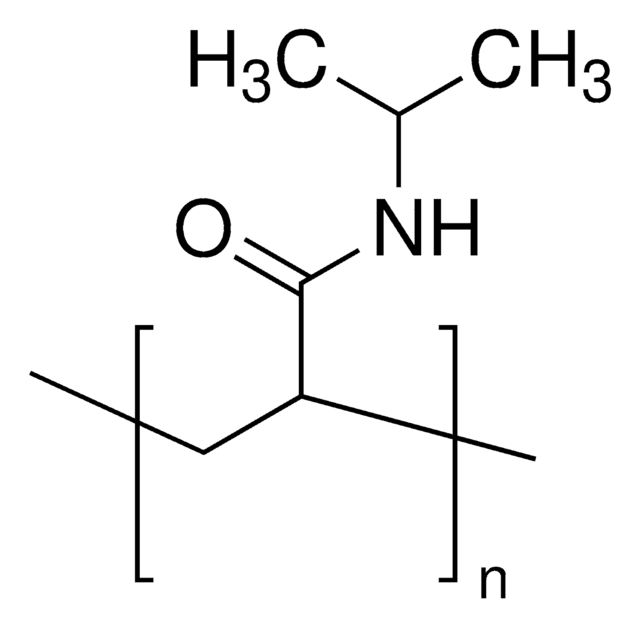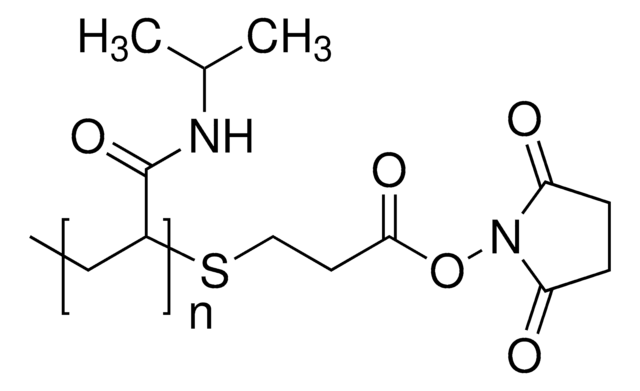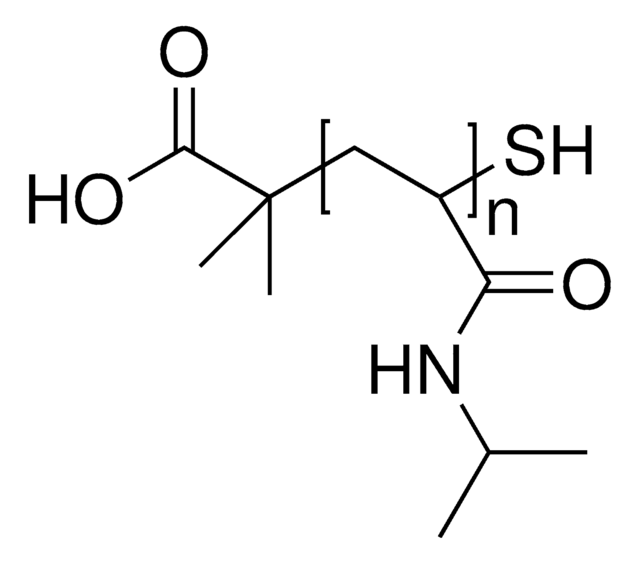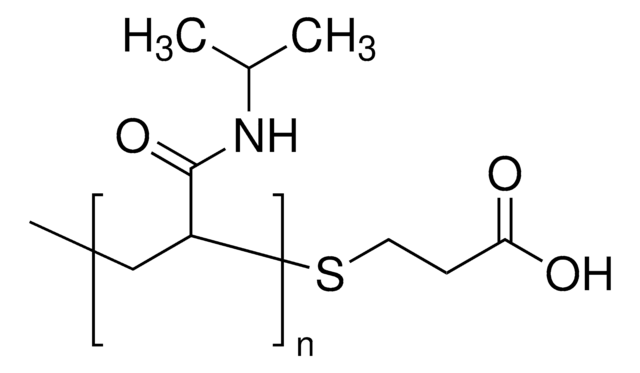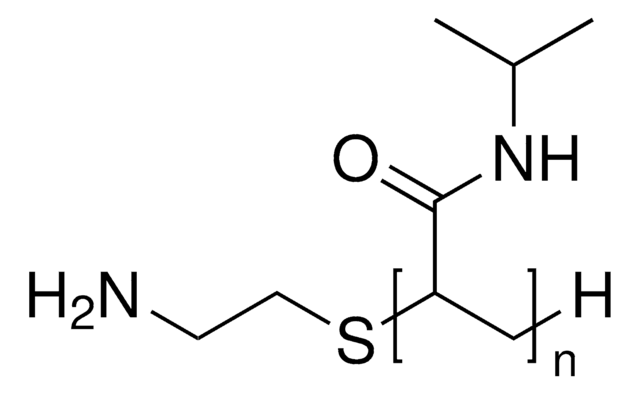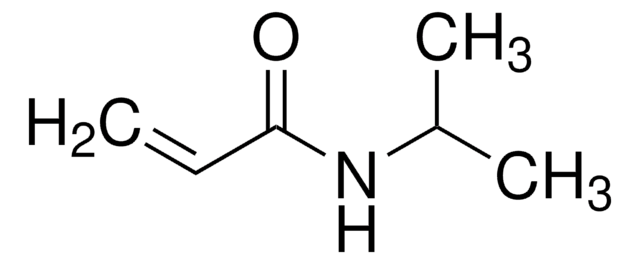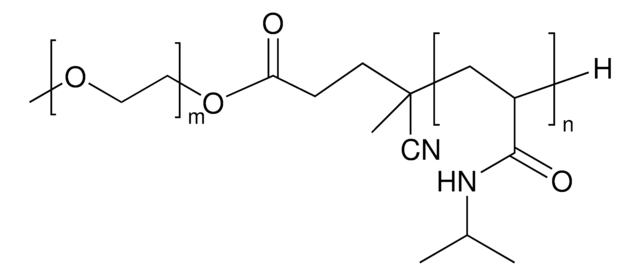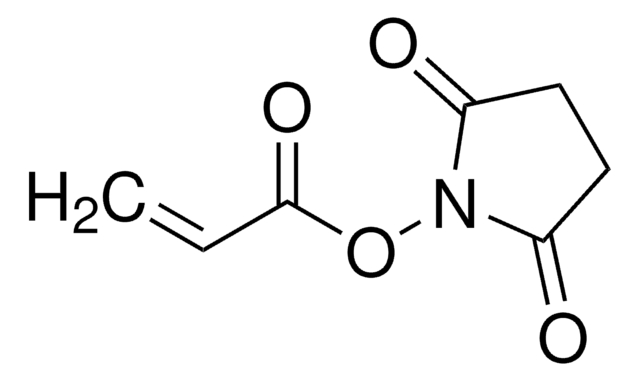900188
Poly(N-isopropyl acrylamide)
NHS ester end functionalized, average Mn 5,000
Sinónimos:
PNIPAM, polyNIPAM
Iniciar sesiónpara Ver la Fijación de precios por contrato y de la organización
About This Item
Fórmula lineal:
C8H10NO4(C6H11NO)nH
Código UNSPSC:
12162002
NACRES:
NA.23
Productos recomendados
Aplicación
Poly(N-isopropyl acrylamide) (PolyNIPAM) is a stimuli-responsive polymer. This product features low polydispersity (PDI), which typically leads to better reproducibility in applications, and a terminal N-hydroxysuccinimide (NHS) functional group, allowing for rapid conjugation of biomolecules, small molecules, or other polymers. PolyNIPAM has been used in development of a variety of thermosensitive coated micro/nano materials, including thermoresponsive polymeric drug delivery systems.
Código de clase de almacenamiento
11 - Combustible Solids
Clase de riesgo para el agua (WGK)
WGK 3
Punto de inflamabilidad (°F)
Not applicable
Punto de inflamabilidad (°C)
Not applicable
Elija entre una de las versiones más recientes:
Certificados de análisis (COA)
Lot/Batch Number
Lo sentimos, en este momento no disponemos de COAs para este producto en línea.
Si necesita más asistencia, póngase en contacto con Atención al cliente
¿Ya tiene este producto?
Encuentre la documentación para los productos que ha comprado recientemente en la Biblioteca de documentos.
Aniket S Wadajkar et al.
Acta biomaterialia, 8(8), 2996-3004 (2012-05-09)
New magnetic-based core-shell particles (MBCSPs) were developed to target skin cancer cells while delivering chemotherapeutic drugs in a controlled fashion. MBCSPs consist of a thermo-responsive shell of poly(N-isopropylacrylamide-acrylamide-allylamine) and a core of poly(lactic-co-glycolic acid) (PLGA) embedded with magnetite nanoparticles. To
Chenglin Yi et al.
Journal of colloid and interface science, 380(1), 90-98 (2012-05-29)
Self-assembled polymeric micelles can be used as efficient particulate emulsifiers. To explore the relationship between micellar structure and emulsification performance, pH- and temperature-responsive self-assembled micelles were prepared and used as emulsifiers, based on a novel grafted polymer poly(styrene-alt-maleic acid)-graft-poly(N-isopropyl acrylamide)
Manuel Pernia Leal et al.
ACS nano, 6(12), 10535-10545 (2012-11-03)
We report a procedure to grow thermo-responsive polymer shells at the surface of magnetic nanocarriers made of multiple iron oxide superparamagnetic nanoparticles embedded in poly(maleic anhydride-alt-1-ocatadecene) polymer nanobeads. Depending on the comonomers and on their relative composition, tunable phase transition
William S Turner et al.
Journal of biomedical materials research. Part B, Applied biomaterials, 100(8), 2060-2072 (2012-08-14)
The packaging and delivery of cells for cardiac regeneration has been explored using a variety biomaterials and delivery methods, but these studies often ignore one or more important design factors critical for rebuilding cardiac tissue. These include the biomaterial architecture
Yan Xia et al.
Chemical communications (Cambridge, England), 49(25), 2566-2568 (2013-02-21)
Site-specific protein conjugates with RAFT polymers were synthesized using expressed protein ligation. Stable micelles were formed from both linear block copolymer and Y-shaped conjugates.
Nuestro equipo de científicos tiene experiencia en todas las áreas de investigación: Ciencias de la vida, Ciencia de los materiales, Síntesis química, Cromatografía, Analítica y muchas otras.
Póngase en contacto con el Servicio técnico